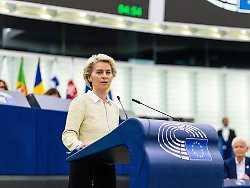Sberbank decoupled from Swift
Von der Leyen no longer wants Russian oil in Europe
05/04/2022 11:22 am
Commission President von der Leyen presents the EU’s sixth package of sanctions against Russia. In addition to a gradual oil embargo, further swift exclusions of Russian banks and pressure on certain media are also planned.
Companies from Germany and the other EU countries should no longer be allowed to import Russian oil in the future. “We are now proposing an embargo for Russian oil. This involves a complete import ban for all Russian oil,” said EU Commission President Ursula von der Leyen in the Strasbourg European Parliament. Russian crude oil shipments are to be phased out within six months and refined product imports phased out by the end of the year.
In addition, the German politician presented further plans for punitive measures against, for example, the largest Russian bank Sberbank, against Russian state media and against those responsible for war crimes. The EU countries still have to unanimously agree to the proposals. They wanted to meet for the first consultations this Wednesday.
Von der Leyen explained her proposal for an embargo including transitional periods: “In this way we maximize the pressure on Russia and at the same time keep collateral damage for us and our partners worldwide as low as possible.” At the same time, the leading politician admitted that the planned import stop will require great efforts from some countries. “Let’s not kid ourselves: it won’t be easy,” she said. According to reports, far-reaching derogations are planned for Hungary and Slovakia. However, von der Leyen did not provide any information on this.
Spin doctors and consultants must avoid Putin
In addition to the oil embargo, the EU Commission’s proposal also includes decoupling three other Russian banks, including Sberbank, from the Swift international financial communication system. “By doing so, we hit banks that are relevant to the Russian financial system and limit Putin’s ability to do further destruction,” von der Leyen said. In addition, European auditors, consultants and so-called spin doctors should no longer be allowed to work for Russian companies and the Kremlin of President Vladimir Putin.
Also part of the plans is a ban on three other Russian state media in the EU. Their transmission frequencies are to be cut and they will then no longer be allowed to distribute their content in the EU – whether via cable, satellite, the Internet or via smartphone apps. “As mouthpieces for Putin, these TV channels have been shown to aggressively spread his lies and propaganda.”
Von der Leyen left open which transmitters should be affected by the punitive measures. At the beginning of March, the EU had already banned the distribution of the Russian state media RT and Sputnik.
“We know who you are”
In addition, those responsible for war crimes in Ukraine should be subject to punitive measures, as von der Leyen said. A list of high-ranking officers and others who committed war crimes in Bucha and who are responsible for the inhumane siege of the city of Mariupol is kept. All “Kremlin soldiers” received the signal: “We know who you are and you will be held accountable.” The sanctions, which EU countries must also agree to, include entry bans and asset freezes.
Von der Leyen suggested putting together an economic stimulus package for the post-war reconstruction of Ukraine. This should include investments to meet needs and for necessary reforms. “Last but not least, the package will smooth Ukraine’s path within the European Union.”
EU citizens could incur significant additional costs, particularly as a result of the oil embargo. Federal Minister of Economics Robert Habeck expects high “price jumps”. One of the reasons is that Russian oil must be replaced by probably more expensive alternatives from other countries. In addition, the conversion of refineries and delivery routes means effort and costs. But hardly anyone dares to predict when and to what extent refueling or heating will become more expensive.
The new package of sanctions is the sixth that the EU Commission and the European External Action Service (EEAS) are launching. The economic punitive measures are primarily intended to help deprive Russia of the financial resources to continue the war of aggression against Ukraine.
